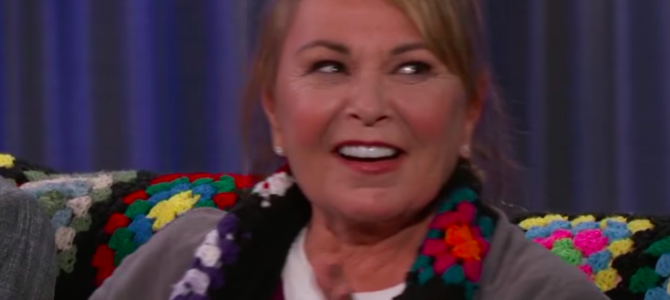Roseanne Barr resisted the pressure to virtue signal for liberals in an interview with The New York Times published Wednesday, leaving the interviewer obviously disappointed by choosing instead to take a moderate tone.
The star of “Roseanne” cast herself as a Trump supporter in the revival season of the hit show returning to ABC this year after a 20-year hiatus. The beloved character was considered something of a progressive champion in the original series, but is taking a more conservative tone this time around thanks to Barr, prompting widespread criticism on the interwebs.
Patrick Healy tried to coax Barr into explaining away or qualifying the choice to air pro-Trump sentiments in the interview, but she refused, taking on a matter-of-fact tone and explaining she thinks it’s important and right to provoke a dialogue about the views of many working-class Americans who support Trump.
HEALY: Roseanne Conner has become a Trump supporter. How did that happen?
BARR: I just wanted to have that dialogue about families torn apart by the election and their political differences of opinion and how we handle it. I thought that this was an important thing to say at this time.
HEALY: Was it your idea for Roseanne to back Trump?
BARR: Yes. Because it’s an accurate portrayal of these people and people like them. In terms of what they think, and how they feel when they are the ones who send their kids over to fight. We’ve been in wars for a long, long time, which everybody seems to forget — but working-class people don’t forget it because their kids are in it.
Healy continued to press Barr to criticize Trump’s policies, and to defend what many see as the show abandoning liberal causes it used to stand for, especially an embrace of LGBT politics. Barr again pushed back, arguing Trump is not against gay people, and is on the side of people who, for example, were “pissed off” over Bill Clinton’s trade policies causing them to lose their job.
HEALY: Considering that Trump opposes many of the principles that you and Roseanne Conner have stood for, how can you support him?
BARR: No, he doesn’t, I don’t think he does. I don’t think so at all. I think he voices them quite well.
HEALY: I’m thinking of abortion rights, same-sex marriage rights, labor protections —
BARR: He doesn’t oppose same-sex marriage.
HEALY: He doesn’t favor it. He has not come out in favor of it.
BARR: He does. Yes, he does. He has said it several times, you know, that he’s not homophobic at all.
HEALY: What about labor union protections and blue-collar workers, and
BARR: What do you mean, the — oh, let’s not get into this.
[A representative for Ms. Barr interjected: “You don’t have to get into it. We can move on.”]
HEALY: Well, you know, it’s —
BARR: Yes, let’s do.
HEALY: A question people wonder about.
BARR: Well, I think working-class people were pissed off about Clinton and NAFTA, so let’s start there. That’s what broke all the unions and we lost all our jobs, so I think that’s a large part of why they voted for Trump because they didn’t want to see it continue, where our jobs are shipped away. So, it’s more, why did people support shipping our jobs away?
Healy continued to press Barr for some kind of tidbit for her progressive fans, this time baiting her to congratulate herself for “paving the way” for LGBT actors, in part by participating in an onscreen kiss with a woman. Again, she repeatedly refused.
HEALY: O.K. Let’s talk about the impact “Roseanne” had as a show. I remember your same-sex kiss with Mariel Hemingway in 1994 and all the queer characters on her show. Do you think that paved the way for the L.G.B.T. characters that followed?
BARR: I don’t know. You’ll have to ask somebody else. It’s not up to me to say those things.
HEALY: But you thought those were important stories at the time, right?
BARR: I wouldn’t have taken the heat that I took if I didn’t think it was an important thing to do. Just like now. I’m taking a lot of heat, and if I didn’t think that I was right and that it was important, by God, I wouldn’t be doing it.
At another point in the interview, Barr indicates she thinks it’s important to counter the prevailing narrative of the time, and she’s happy for an opportunity to do that and to take on the resulting criticism.
“You know, people only want to see — they want to stick to their narrative and they don’t want it shaken up,” she said. “But, you know, I was like, ‘Oh, here we go. I’m just the person for this job.’”









